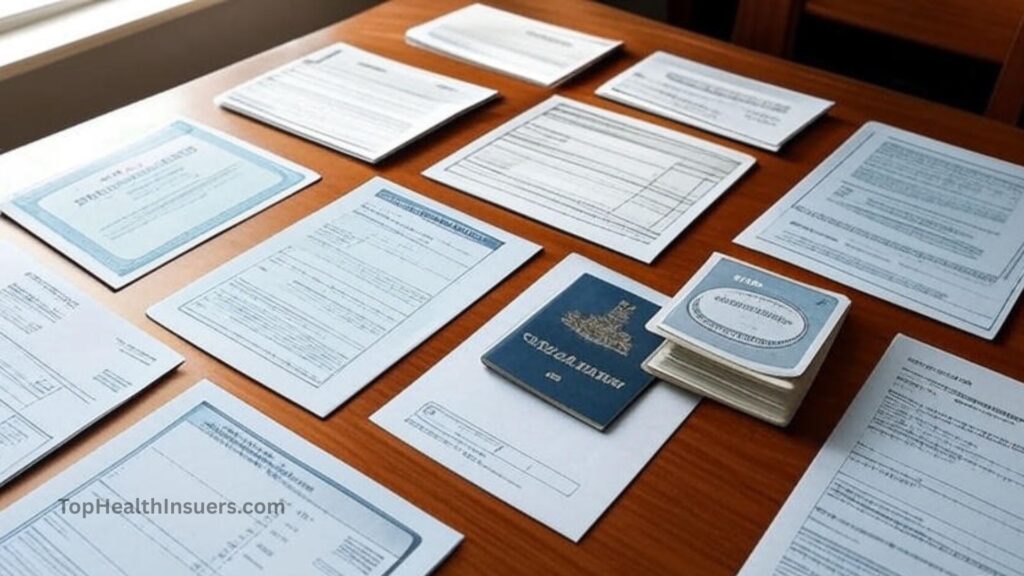What Documents do I Need to Enroll in Health Insurance?
Health insurance isn’t just a financial tool—it’s a safety net that protects you and your family from unexpected medical expenses. With the rising costs of healthcare, even a minor hospital visit can become a financial burden. That’s why enrolling in health insurance promptly is crucial. But before you dive in, you need to understand the paperwork involved. Gathering the necessary documents ahead of time can make your application process smooth, fast, and stress-free.
In this guide, we’ll break down the essential documents you need, provide actionable tips, and even share real-world examples to help you navigate the process like a pro.
1. Identity Proof
Your identity proof is a primary requirement for health insurance. It confirms who you are and helps prevent fraud during claims. Most insurers accept:

- Aadhaar Card
- Passport
- Voter ID
- PAN Card
- Driving License
Example: If you’re enrolling online for a family floater plan, your insurer may need scanned copies of each family member’s identity proof to verify the policyholders.
Tip: Always ensure your name is consistent across all documents to avoid delays in processing.

Also Read: Are Employer-Sponsored Plans Better than Private Plans?
2. Age Proof
Your age plays a critical role in determining eligibility, premiums, and coverage limits. Accepted age proof documents include:

- Aadhaar Card
- Birth Certificate
- Passport
- Driving License
- Voter ID
- PAN Card
- School Leaving Certificate / 10th or 12th Mark Sheet
Example: A 55-year-old applicant might face higher premiums compared to a 30-year-old. Accurate age proof prevents discrepancies during claims or policy renewals.

Also Read: What is a Deductible in Health Insurance?
3. Address Proof
Insurers require your address to communicate important policy details and settle claims efficiently. Commonly accepted documents are:
- Aadhaar Card
- Voter ID
- Passport
- Driving License
- Electricity Bill
- Phone Bill
- Ration Card
Note: Some policies, like region-specific cashless hospitalization plans, require a verified local address to activate network hospital benefits.
4. Income Proof
Not all plans require income verification, but if you are applying for policies with tax benefits or higher coverage, insurers might ask for:
- Salary Slips
- Income Tax Returns (ITR)
- Form 16
Income proof helps calculate premiums accurately and ensures transparency.
Pro Tip: Freelancers or self-employed individuals can submit bank statements or professional tax filings as proof.
5. Passport-Sized Photos
Typically, 2–4 recent passport-sized photos are required. These photos are attached to your application and used for verification during future claims.
Example: For senior citizens applying offline, clear photos help hospitals quickly identify policyholders during emergency admissions.
6. Medical Reports
Depending on your age, health, and plan type, insurers may ask for:
- Recent test results (blood tests, ECG, etc.)
- Details of pre-existing conditions
- Past hospitalization records
These reports allow insurance companies to assess risk and decide on coverage terms.
Example: If you have a history of diabetes, providing recent HbA1c test results may help the insurer approve your coverage without unnecessary exclusions.
7. Proposal Form
The proposal form is your main application. It includes:
- Personal details
- Medical history
- Desired coverage and add-ons
Tip: Fill it out truthfully. Any misinformation can lead to claim rejection later.
Pro Example: Some insurers now allow online submission with e-signatures, making the process faster and paperless.
8. Renewal Notice (For Existing Policies)
If you’re renewing an existing policy or switching to a new plan, submit your renewal notice. This helps insurers:
- Track your no-claim bonus
- Review current coverage
- Determine policy continuity
Example: A family renewing a comprehensive health policy benefits from accumulated no-claim bonuses, reducing premium costs.
Tips to Make the Process Easy
- Gather Documents Early – Avoid last-minute stress by collecting all necessary documents in advance.
- Double-Check Information – Ensure your details match across all documents. Even minor errors can delay processing.
- Understand Your Coverage – Know what’s included, excluded, and how to make a claim.
- Keep Copies – Store digital and physical copies for future reference or emergencies.
- Use Online Tools – Many insurers provide online document submission for faster processing.

Also Read: Are there Hidden Fees in Oscar Health Plans?
Conclusion
Enrolling in health insurance doesn’t have to be complicated. By knowing exactly what documents you need, you can save time, avoid errors, and ensure smooth processing. Always prepare early, double-check your information, and keep copies handy for emergencies.
Taking these steps not only secures your health financially but also provides peace of mind in an unpredictable world.
CTA: Ready to secure your health? Start gathering your documents today and compare plans from top insurers to find the best coverage for you and your family.
FAQs About Health Insurance Documents
Q1: Can I apply for health insurance without a PAN card?
Yes, while PAN helps in verification, other documents like Aadhaar or Passport can serve as identity proof.
Q2: Do children need separate identity proofs?
Yes, especially for family floater plans. Birth certificates are commonly used.
Q3: Are medical tests mandatory for young applicants?
Not always. Typically, applicants under 45 may not require extensive medical reports unless they have pre-existing conditions.
Q4: How long are these documents valid?
Generally, government-issued IDs and recent medical reports are valid. Address proof should not be older than 3 months for bills.
Q5: Can I submit digital copies of documents?
Yes, most insurers accept scanned or photographed documents for online applications.

Post Comment